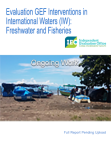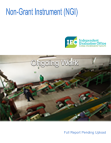When you first hear the phrase "environmental peacebuilding," you may think that these two words are not directly linked. Think again. Many conflicts around the world affect and are affected by, at least indirectly, the environment and natural resources. For example, the extraction of minerals…
Evaluation must rise to the challenge of pandemic in the nexus of nature and humanity
Programs combating Illegal Wildlife Trade are instrumental in controlling and preventing pandemics
The current COVID-19 pandemic is a zoonosis- a disease or infection that is naturally transmissible from animals to humans and can be caused by viruses, bacteria, parasites, or unconventional agents. Infection is spread through direct and indirect contact, through vectors, and…
Third Professional Peer Review of the Independent Evaluation Function of the Global Environment Facility and IEO Action Plan
Evaluating the Impact of Environmental Interventions during a Global Quarantine
by Geeta Batra, Dan Runfola, Heather Baier
Introduction -
The COVID-19 crisis has turned impact evaluators' lives upside down: suddenly, we can't visit the sites we are responsible for, interview participants in person, or otherwise conduct assessments as…
Evaluating environmental peacebuilding: Difficult but necessary
By: Amanda Woomer, Associate Director, MEAL, Habitat for Humanity International
When you first hear the phrase "environmental peacebuilding," you may think that these two words are not directly linked. Think again. Many conflicts around the world affect and are affected by, at…
MSP 2020 Approach Paper
APR 2020 Approach Paper
Evaluation of GEF Interventions in International Waters (IW): Freshwater and Fisheries
Non-Grant Instrument (NGI)
Within the context of GEF programming, a non-grant instrument may be understood as a mechanism to provide financing for activities that have a potential to generate financial reflows for the financer, irrespective of whether such reflows materialize. Cumulatively, GEF has provided a financing of…

